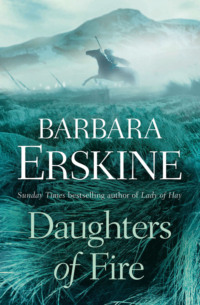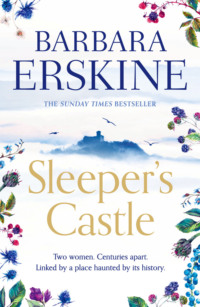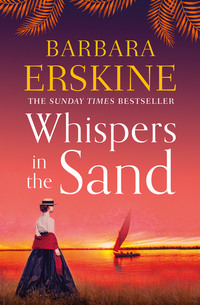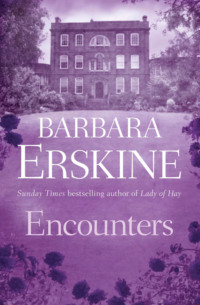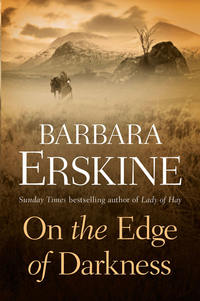
Полная версия
Kingdom of Shadows
He sat down on a chair near her and leaned forward, his elbows on his knees, his chin cupped in his hands. Whatever he felt about Clare he had never before found himself feeling sorry for her, but now suddenly there was a wistfulness in her face which made him feel strangely protective.
‘Paul has asked me whether I would be prepared to break the children’s trust fund.’ He looked thoughtfully into the fire. ‘I take it that that was your idea?’
‘My idea?’ Clare sat back on her heels and looked up at him. ‘I don’t know what you’re talking about.’
‘Don’t you?’ He looked pained. ‘Paul feels that Father’s will, because it was so heavily weighted towards his grandchildren, actual and potential, is grossly unfair. My children, and Geoffrey’s and Em’s, will inherit the bulk of Father’s estate when they grow up.’ He glanced at her. ‘Paul feels we should split up the money so that he can take a quarter.’
Clare put her cup and saucer down on the hearth and climbed to her feet. ‘And you think that is my idea?’
David hesitated, scrutinising her face, then he shrugged.
‘I thought it might be. It seems strange that Paul should suddenly want the money.’
‘And you thought it must be the grasping wife?’ Clare bent to pick up a log from the basket and threw it into the fire, watching the flames lick round it. She swung round. ‘Well, it wasn’t, but I can guess why he’s done it.’ She was suddenly on the defensive. ‘He wants it because he knows he will never have any children to inherit anything, at least not as long as he’s married to me.’ She clenched her fists. ‘But no doubt he told you that. Perhaps he feels this is just compensation for having a barren wife. It is his share of the inheritance, I suppose, so why shouldn’t he have it?’
‘Exactly.’ Behind them Paul had appeared in the doorway. ‘So, is that why you’ve come, David? To give me your decision?’
He strode into the room and leaned against the oak chest near the door, his folded arms concealing his agitation. ‘Have you and Geoff talked it over?’ His voice was heavy.
‘Geoffrey is away at some conference.’ David adopted a soothing tone which managed to sound patronising. ‘But I’m sure we’ll be able to agree about this when he gets back.’
His tone visibly irritated his brother.
‘And how much do you suppose you will be able to spare me after your deliberations?’
‘That is rather up to the four of us, as trustees, and to the accountants, don’t you think?’ David said dryly. ‘If you feel you are entitled to a particular percentage, you’d better say so. The money you’re talking about is at the moment to be divided equally between the children as they reach the age of eighteen with a capital sum remaining to give each of them a small income and to cover any late arrivals.’ He gave a tight smile. ‘We four are supposed to have had our share when Father died, remember?’
‘Of course I remember.’ Paul turned away sharply. He went across to the window and stared out at the mist. The chestnut trees were dripping dankly on the lawn, their golden leaves mud-coloured without the sun.
His brother was watching him closely through narrowed eyes. ‘Well, if you still want to go ahead with this, I suggest we call a meeting of the trustees to discuss it.’ He stood up. ‘I’ll ring Geoff tonight and see if he’s back. I think I should tell you, Paul, that Gillian and I are not very happy about this.’
‘I’m sure you’re not!’ Paul didn’t look round. ‘Your bloody kids get the lion’s share.’
‘They will get an equal amount each.’ David was tight-lipped as he strode towards the door. ‘I’m sorry Paul is putting you through all this, Clare –’ as he opened it he glanced back at her. She was still standing by the fire, her face set. ‘You deserve better, my dear.’
Clare watched until her brother-in-law’s old Bentley had disappeared up the drive, then she turned towards Paul.
‘Why didn’t you tell me you wanted to break the trust?’
He left the window and threw himself down with a sigh into the chair his brother had just vacated. ‘There is nothing to tell as yet. But Geoffrey will agree with me because it’s the Christian thing to do and Em will agree because it’s fair.’ He gave a grim smile.
Clare bit her lip, trying to fight down the guilt and unhappiness which were threatening to swamp her. She was watching him closely, and she realised suddenly through her misery that the strained transparency of the skin around his eyes and the loss of weight in his usually solid face had not just happened in the last few days. His concern about money, and his bad temper, had been going on now for months; since the end of June when they had learned that she would not inherit any money from Margaret Gordon’s will. Yet Paul was a rich man – both from his father’s money which, as David had pointed out, had been considerable, and through his investments. She frowned. ‘Are you worried about money for some reason, Paul?’ she asked wearily. ‘Nothing has gone wrong in the City has it?’
‘Gone wrong?’ He stared into the fire. ‘Of course not. Did it look as if anything were wrong last night?’
‘No.’
‘Well then.’ He flung himself back in the chair and closed his eyes. ‘There is nothing to worry about, is there?’
The helicopter hovered for several minutes over the field, then it circled the castle, the huge rotor blades fanning the branches of the rowan and birch, parting the grasses until they bent and streamed like water. On the cliffs the birds flew up in clouds, screaming, their cries drowned by the roar of the engine.
Rex Cummin leaned forward, staring down, his eyes fixed on the pile of grey stone which had been the tower of Duncairn. He had a note pad on his knee and there was a pen in his hand, but he made no attempt to write. Out at sea the fog banks were a pearly white, obliterating the horizon, but inland the ground was bathed in sunshine. His eyes gleamed. Far below the sleeping rock, below the matted bracken and heather and dry grass there was oil. He knew it in his bones.
In the hotel Jack Grant stood at the office window watching as the helicopter circled. He frowned, noting the logo painted on its side, then he reached for the phone and dialled the number Neil had given him.
He consulted his notes. ‘Does the Greek letter Sigma mean anything to you?’ he asked as the line connected.
In Edinburgh Neil cursed.
8
The offices of Sigma Exploration were on the third and fourth floors of a glass-fronted block overlooking the Thames at Westminster. Sitting at his desk in the deeply carpeted, luxurious executive suite, Rex Cummin could look across the river towards the Houses of Parliament and it still gave him something of a thrill, after three years, to see the silhouette of the Victoria Tower and Big Ben against the clear duck-egg glow of the early morning London sky.
He was sitting at his desk now, and in front of him on the blotter was a closely typed report. He picked it up and read it again slowly. He was smiling.
… Beattie Cameron Westlake Pierce … rumours about undercapitalisation … insider dealing … possible investigation by the Stock Exchange Council … Paul Royland’s name mentioned in the press, on each occasion unfavourably … directors in internal squabble over funding … Sir Duncan Beattie defends Royland to colleagues over Beattie Committee controversy … MP’s brother suspected over collusion in funding scandal …
Rex’s face creased into a contented smile. He picked up the phone.
‘Leonie, honey, would you fix up a lunch with Diane Warboys for me? It must be before Friday. You’ll find her number in the file under BCWP in Coleman Street. Oh, and honey, would you send some flowers to Mrs Clare Royland? I have her address here, and I’ll give you a note to go with them.’ He chuckled as he put down the receiver.
He lay back in his chair and, tapping his teeth with his pencil, he picked up the report again. At last things were beginning to go his way.
Emma was meeting Diane Warboys that lunchtime at El Vino’s in Martin Lane. She glanced at her watch and then looked around her again at the other diners, drumming her fingernails on the menu which lay beside her on the checked cloth. Sally would only cover at the gallery for another couple of hours. It wouldn’t give them much time.
They had drifted into meeting about once every two or three months after they first met more than a year ago at a party James had given for some of his friends and colleagues at his flat in the Barbican, and Emma found herself frequently asking herself why she and Diane should get on so well together. They were so different in every way. Diane, American, brittle, ambitious, smart as a fashion plate, efficient, very bright and dedicated to her career; herself, not exactly dowdy – more comfortable, bright, yes, efficient, no – She smiled to herself. A career woman too, now, or trying to be, with the gallery on Kew Green nearly six months old. For a while Emma had wondered if what she and Diane had in common was her husband, Peter, but on the whole she thought not. Surely, Diane wouldn’t be able to look her in the eye if that were so.
‘Hello. I’m sorry I’m late.’ Diane descended into the chair opposite Emma and propped an attaché case against the table leg. ‘We were dreadfully busy in the office this morning; and I’m afraid I’ll have to be fairly brief. The boys are covering for me, but I never like to let them think they can manage without me for too long.’ She smiled. ‘What are we drinking?’
‘In my case white wine.’ Emma indicated her glass.
‘I’ll have the same. So, how are you? Are you coming to Singapore with Pete?’
Emma could feel herself stiffening. ‘Was I invited?’
Diane looked at her steadily. ‘I don’t know. Were you?’ She paused for a moment, searching Emma’s face. ‘Pete and I have never had an affair, you know. There is nothing like that between us.’ She smiled at the waitress who had brought her glass.
Emma looked down at the table. ‘I never thought there was,’ she said quickly. Too quickly. Had her thoughts been that easy to read?
Diane reached over and picked up the menu. ‘There is no time for that kind of relationship in the office, Emma. You should know that. Incestuous though the City is with everyone knowing everyone, it just wouldn’t work. Not for long. With your husband and your brother working there you should know that.’ There was a moment’s silence as she studied the menu, then she looked up. ‘Paul is a workaholic like Peter, I suspect, isn’t he?’ The question was very casual.
Emma laughed. ‘I suppose he is; I try and avoid my brother where possible. We don’t get on.’
Diane played with the stem of her glass. ‘I had dinner with Paul and Clare on Saturday.’ She smiled reminiscently. ‘It was marvellous. Clare went into some sort of trance in the kitchen, or that is what Henry thinks – anyway she disappeared for a long, long time, and dinner was an hour late. Paul nearly had a fit because the Beatties were there, and Clare was unrepentant and told Lady Beattie she was someone of no importance.’ She chuckled again at the memory as she sipped her wine. ‘Paul and Clare don’t get on, do they?’
Emma frowned. ‘I think they’re going through a rough patch,’ she said cautiously. She glanced at Diane. During the week the latter wore no make-up at the office – her face was ostentatiously naked, the lashes thin and fair, almost invisible. It made her look very young and naive. Emma wasn’t fooled. ‘I doubt if Paul would ever have an affair,’ she said gently. ‘He really isn’t keen on women at all.’
‘But he’s not queer?’
‘Of course he’s not queer. But he is single-minded; and cold. I was never actually sure why he married Clare.’
‘For her money?’ Diane raised an eyebrow.
‘Perhaps.’ Emma shrugged. ‘Not that she has as much as all that; not as much as people think. Just her lands in Scotland which I suppose might be worth a fortune. I don’t know. I do know Paul was furious when she didn’t inherit any money as such.’ She paused, frowning suddenly. Had he just married Clare for her money? Was that the reason Clare was so unhappy now? ‘Clare is a very attractive woman,’ she went on, half thoughtfully. ‘I don’t see any reason why he couldn’t just have fallen in love with her. She was all right, was she, after her’ – she hesitated – ‘her trance?’
‘Right as rain. In fact she was more animated than I’ve ever seen her. She and Paul –’ Diane paused, choosing her words with care. ‘Do you think their marriage is over?’
‘No.’ Emma was suddenly resentful of the questions. ‘No, I’m sure it isn’t. They’ll be fine. All they need is a bit of time to get over their disappointment about not being able to have children.’
‘I didn’t know they couldn’t have children.’ Diane raised an eyebrow.
‘I’m sure they don’t broadcast the fact. And don’t you, either. I shouldn’t really have told you.’
‘Oh come on. I’m a family friend.’ Diane sat back in her chair and crossed her long legs uncomfortably under the small table. ‘Besides, who am I going to tell? I don’t know anyone who would be interested.’
‘Would you like me to get anything for you when I’m in Ipswich this afternoon, Mrs Royland?’ Sarah appeared in the doorway of the drawing room so suddenly that Clare jumped.
She pushed back the pile of unopened letters on her writing desk – the invitations to charity events, the pleas for money, at least two demands that she join fund-raising committees; she didn’t have to open them to know what they were. She glanced out of the window at the hazy garden and sighed. The sun was just breaking through the mist, shimmering on the copper and russet leaves of the chestnuts in the drive. Clare sighed. She stretched her arms up above her head. ‘You know, it’s so beautiful today, I think I might come with you. I could do with a change of scene.’
Sarah frowned. ‘It wouldn’t really be very easy, Mrs Royland. I …’ she hesitated. ‘I’ve so many different things to do. But I’d be happy to pick anything up for you.’
Clare bit her lip, trying not to feel rejected, trying to fight down the feeling of desolation which threatened to overwhelm her. Paul had left for London that morning, before it was light. He had slept in her bed, but he hadn’t touched her. If Sarah went out and left her in the house alone, the loneliness would return, and with it the need to fill the emptiness with daydreams. She stood up. She would go too. She must. Suddenly she was afraid, terrified of the silent rooms. She turned to follow Sarah into the hall, but as she reached the door, the phone rang. With a pleading glance at Sarah’s departing form she turned back and picked it up.
‘Clare? It’s Chloe. My dear, I had to ring you. What on earth have you been getting up to?’ Her sister-in-law sounded breathless with excitement.
Clare sat down again, making a determined effort to steady herself, her fingers once more, automatically, idly, turning over the letters on the desk. Even without the sound of car tyres on the gravel outside she had known Sarah would take the chance to go without her. Her heart sank. Another afternoon alone in the house; and probably a whole evening after it, and then the night, all to be got through somehow. She sighed, fighting back the fear.
‘Clare, are you there?’ Chloe sounded indignant. ‘I shouldn’t tell you, but Geoffrey is praying for you!’
‘Praying for me?’ Clare’s attention snapped back to the phone.
‘He’s desperately worried about you and I thought I’d better warn you, he’s going to come up and see you.’
‘What on earth for?’ Indignantly Clare stood up. She shuffled all the envelopes into the waste bin, and stood staring out at the grass where a blackbird was standing, head cocked to one side, intently watching a patch of daisies. ‘If it’s to do with my inability to have a baby, it’s a bit late for prayers.’ She couldn’t keep the bitterness out of her voice. ‘Unless one believes in miracles.’
‘Oh, Clare.’ For a moment Chloe was silent. ‘My dear, I was so sorry to hear about that, and it’s never too late to pray about something so important, but that wasn’t what I meant.’ She sounded deflated.
‘What then?’ Clare picked up the phone and walked to the french windows. She pushed them open and stepped out on to the terrace. The sun was warm on her head, the garden still.
‘Emma came to see us last weekend, just before Geoff went off to his conference. She came to talk about her and Pete. You know they’re having problems with their marriage because Peter is away so much. Well, Geoff took her off into his study and’ – Chloe’s voice took on a hollow ring supposed to denote awe – ‘they talked for ages.’
‘So?’
‘They talked about you.’
‘Me?’
‘It took me hours to wangle it out of him later. Clare, you must be doing something truly dreadful! Emma only mentioned it casually at first. Geoff said she didn’t seem worried. He said she didn’t realise what you were up to. So, what are you doing? Are you sticking pins in wax figures, by any chance?’ There was a breathless pause.
‘I see.’ Clare smiled wryly. ‘Oh, it’s far worse than that.’ It was hard to resist the temptation to tease her credulous sister-in-law. ‘In fact I doubt if you should even risk talking to me! The telephone wires might go white hot and burn you.’ She walked restlessly back into the house, the phone in one hand and the receiver in the other, trailing the long flex behind her. Damn Emma. Who else had she told? ‘Tell Geoff not to bother coming, Chloe. I’m beyond redemption. I’m unrepentant and probably dangerous.’ She meant it to come out jokingly, but her voice sounded too serious. Behind her the door opened a crack and a golden nose pushed through it enquiringly. Clare ignored it.
‘You must talk to Geoffrey, Clare.’ Chloe’s voice had lost its lightness. In the rectory she shivered suddenly. ‘Please. He genuinely wants to help you.’
‘I told you, tell him not to come. Tell him to mind his own business.’ Clare took a deep breath. ‘I’m sorry, I shouldn’t have said that. It’s just that there are too many people breathing down my neck at the moment, Chloe, and I don’t need it. Whatever problems I’ve got I have to sort them out myself. Look, I’ve got to go.’ Suddenly she couldn’t bear to talk any more. ‘I’ll see you in London soon. We’ll have lunch. OK?’
She put the phone down, not sure whether to be angry or amused. First Emma; now the pompous pontiff; Chloe; Henry; Zak!
Was it really so dangerous to daydream about the past?
Thoughtfully she walked upstairs, past the flowers in the hall and on the landing, smelling the polish and the roses, seeing the curtains blowing gently in the breeze. The afternoon was hot and still and her bedroom was very silent, shadowed by the half-drawn curtains. She stood in front of her dressing-table mirror and studied her eyes critically. They were large, a clear transparent grey, with a slightly darker ring around the iris, fringed with long dark lashes, set attractively far apart beneath a broad brow. Her fair skin was tanned to an even gold. She stared at herself, unblinkingly critical, then she began to pull off her clothes. Naked, she wrapped a towel around herself and ran downstairs.
The heavy cover was over the pool but she dragged it off, feeling the wind cold now it was touching her skin, negating any warmth there might be in the hazy sunshine. Throwing down the towel she dived in, feeling her breath caught and dragged from her body by the chill of the water.
Twenty minutes’ swim and an hour’s gentle, meticulous yoga left her body toned and relaxed, receptive. Automatically she drew her legs into the cross-legged position, resting her hands, forefinger and thumb circled, on her knees. Slowly she emptied her mind. Around her the crisped autumn leaves drifted down onto the pool and settled in the still, clear water. She did not see them. She was repeating to herself, as Zak had taught her, the mantra which would dispel all outside thoughts.
Om Nama Shivaya; Om Nama Shivaya; Om Nama Shivaya …
Don’t let the mind stray; don’t let any pictures come; relax; gently hold the mantra.
Om Nama Shivaya; Om Nama Shivaya …
She was stiff and cold when she had finished. Dragging the cover over the pool once more, she made her way back to the house. The kitchen was immaculate as usual, not so much as a teaspoon out of place. She curbed a sudden childish urge to make an incredible mess and went instead to the bread bin. She cut herself a thick wedge of Sarah’s homemade bread and plastered it with butter and honey, then she wandered into the hall. The house was totally silent. Casta was asleep on the lawn, under a walnut tree. Standing at the window, eating her bread, Clare watched the dog for a while, thinking idly that this – eating and doing nothing – was how people got fat. She turned. Even the fire was silent. Sarah hadn’t bothered to light it that morning, and neither had she.
The phone rang as she was reaching for the box of matches.
‘Clare, I shall need you in London on the first of November. Would you put it in your diary? Dinner with the Beatties.’ Paul’s voice was uncompromisingly brusque.
Clare hitched herself up on to the table, still wearing only the towel, the wedge of bread in one hand. ‘So, they’ve forgiven me, have they? And until the first, Paul. Won’t you be needing me until then?’ She emphasised the word sarcastically.
‘Clare.’ His tone was warning.
‘That is, by my count, Paul, nineteen days. One could go around the world comfortably in nineteen days. I can have a fortnight in Scotland and still be back easily –’
‘No, Clare! I said, no!’
‘Just how do you intend to stop me, Paul?’ To her annoyance she found her voice was shaking. ‘I’m not your property; you don’t own me.’
‘Clare.’ Paul took a deep breath, clearly audible over the phone. ‘Darling, you’ve misunderstood me. I do need you there.’ He enunciated the words slowly as if she were a half wit. ‘Look, I’ll be home tomorrow night. We’ll talk then. I …’ he hesitated. ‘I have a surprise for you.’
‘Really?’ Clare raised an eyebrow. ‘To have you home mid week would be surprise enough.’ She hung up and took a bite out of her bread, feeling surprisingly cheerful suddenly. For once she had had the last word. And she was right. He didn’t own her. She was not a prisoner. There was nothing to stop her leaving. Her car had been left in London because she had driven back with Paul in the Range Rover, but there were trains and taxis. She wasn’t locked in and spied on like poor Isobel. She stood up. To plan her escape would give her something to do today. She could find out train times, plan connections, arrange to hire a car when she got to Aberdeen, and in the meantime there was always Isobel.
She finished her bread and honey thoughtfully. If there was some threat in Isobel’s appearance it was being perceived by others, not herself. She had been afraid when Isobel appeared suddenly and uninvited before the dinner party in London, but that had been because it had taken her by surprise. Now, when she thought about it, she could see what had happened. She had been tired. Her mind had been distracted, she had sat down with the specific intention of relaxing for a few moments, and she had lit her candles. Her brain had misinterpreted the signs, that was all. There was nothing sinister in it. To Clare, Isobel was a friend – a companion – a part of herself. Why should she let other people make her afraid of summoning the past? What possible harm, logically, could there be in a dream?
It was as if a tremendous weight had been lifted from her mind. There was nothing wrong in daydreaming. Her mistake had been to tell people about it. Everyone had their secret dreams and memories; she was no different from them. Except that she had talked about them. In future she would make sure that she kept them to herself.
Buoyed up with sudden resolution Clare ran up to her bedroom and, carefully closing the door, she pulled open the drawer in her dressing table where she kept the candles. Shivering as her towel slipped to the floor, she paused. For a moment she frowned. She wanted to stand naked before the candle flame, arms raised to draw back the veil into the past. It seemed a dramatic, almost natural gesture to make, one of which Isobel would have approved; one she might have made herself. But was that somehow wrong? Did that smack of deliberately summoning spirits? Was that what Zak and Geoff were afraid of? For a moment she hesitated, tempted, then, with sudden self-consciousness she turned away. She pulled on some jeans and a sweater.


